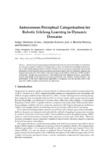Autonomous Perceptual Categorization for Robotic Lifelong Learning in Dynamic Domains

Use este enlace para citar
http://hdl.handle.net/2183/41089Metadatos
Mostrar el registro completo del ítemTítulo
Autonomous Perceptual Categorization for Robotic Lifelong Learning in Dynamic DomainsFecha
2024Resumen
Autonomously acquiring grounded information from on-line interaction in continuous and dynamic domains unknown at design time, to allow for abstraction and high-level reasoning, is still a challenging problem in robotics. In this work we propose an approach based on the generation of task-based dynamic perceptual equivalence classes that are constantly updated and adapted during the life of the robot, using three types of algorithms within the e-MDB cognitive architecture. Results are presented for a robot interacting with different domains, demonstrating the adaptability of the approach through experiments with arbitrary domain changes. The performance of the three implemented algorithms is compared, and the possible uses of this approach within cognitive architectures are discussed.
Palabras clave
e-MDB cognitive architecture
Robot
Robot
Versión del editor
Derechos
Atribución 4.0






